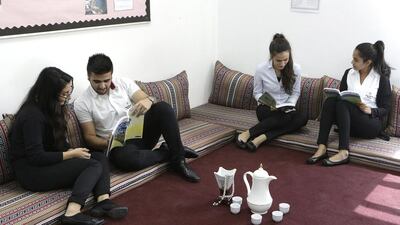DUBAI // In a classroom at Dubai British School a majlis seating area and crockery are set up, lending a traditional Emirati feel to an Arabic language class for native speakers.
Mohamed Nazief, head of Arabic and Islamic education and social studies at the school, said it was important for the handful of pupils in Arabic A to feel at home when they practised the language.
“We want them to love to learn their mother tongue,” he said, adding that soon they would be transforming the room into a tented area to add authenticity.
Teacher Kamel Al Fahel, a Syrian, questioned pupils on paragraphs from the Quran as his pupils got to work. Opposite the hall, Muna Hussein takes Arabic B – advanced classes for non-native Arabic speakers.
She preferred to banter with her class rather than set written tasks, and children play games on iPads and on laptops to practise words and phrases.
Ms Al Fahel’s aim is to get pupils using phrases they might use in everyday life.
“For these students it’s a completely different language,” she said. “Other languages they might learn in their home country – French or Spanish, for example – they have similarities to their first language.
“But not Arabic, so for me it is important that we try and make it fun and interactive, especially as some students might be here just for one or two years.”
Pupils perched at the end of their seats as they learnt the agenda of the lesson – how to describe themselves in Arabic.
Two took it in turns to describe themselves – the colour of their hair and the colour of their eyes.
Aaliyah Ul Haq, 12, said she enjoyed the time dedicated each week to learning a language. The Pakistani said: “I enjoy learning new things. I enjoy learning the meaning behind it and learning about the Arabic culture.”
The Grade 8 pupil said she could read full paragraphs in Arabic, in part because of the fun learning style in the classroom.
“We go on websites and play games such as scratch cards or quizzes in Arabic to help us learn common words and phrases and remember them,” she said.
Classmate Imogen Welch, a 12-year-old Australian who has been in the UAE for a year, agreed. “We get to make flash cards and practise with each other and we use an online game which helps us pair Arabic words together,” she said.
Down the corridor, in Arabic B beginners class, teacher Khloud Shamayleh led pupils in a raucous song in Arabic before the class was asked individually to give a sentence that summed up a member of their family.
“My mother is short but beautiful,” said one in Arabic. “My father is tall but handsome.”
Ms Shamayleh said it was important to change the stereotype of Arabic teaching. “People say Arabic is boring but this doesn’t have to be the case,” she said. “I want kids here to have fun and love to learn. If they are happy, they will learn more.”
Benjamin Anderson, a Scottish-American expat, has been learning Arabic for four years.
The 12-year-old Grade 8 pupil said: “It does help that teacher makes it fun – I feel this way anyone could pick it up.”
Classmate Khadija Asim, a 12-year-old Canadian, agreed. “It is fun when she asks us on-the-spot questions – it is a fun way to learn rather than copying something down,” she said.
“It does help, such as when my mum is driving and someone rolls down the window and asks for directions. My mum doesn’t speak Arabic so she turns to me to translate, which is nice.”
newsdesk@thenational.ae

